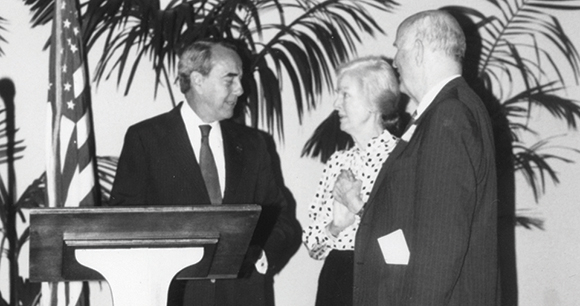Senator Robert Dole (R-KS), who died in December at age 98, was a steadfast and skilled advocate of federal protection for animals. As a member of the House of Representatives in the 1960s, he served on the Agriculture subcommittee that approved the Laboratory Animal Welfare Act. This 1966 law—later renamed the Animal Welfare Act (AWA)—set minimum standards for the handling, sale, and transport of dog, cats, nonhuman primates, rabbits, hamsters, and guinea pigs held by animal dealers and research laboratories and included measures to prevent pets from being stolen and sold for experimentation. After he moved to the Senate, Dole was responsible for a 1970 amendment that expanded AWA coverage to all warm-blooded animals in research and required appropriate use of anesthetics and other tranquillizing drugs during experiments.

Dole also sought to protect farm animals at slaughter, stating, “Our national morality and concern for other living creatures demand legislation to prevent needless suffering by the animals that provide such an important part of our food supply.” He and Representative George Brown Jr. (D-CA) sponsored a 1978 amendment to the Federal Meat Inspection Act that expanded coverage to imported meat and gave inspectors the authority to stop the slaughter line to prevent inhumane practices.
But Dole’s greatest achievement on behalf of animals was securing the 1985 adoption of the Improved Standards for Laboratory Animals (ISLA) amendment to the AWA—prompting AWI to award him the Schweitzer Medal the following year. On this legislation, Dole once again worked with Rep. Brown, with Dole sponsoring the Senate bill and Brown sponsoring the House version. It took five years to achieve, and industry opponents fought it every step of the way, but Dole stood firm. He noted during debate that the legislation was intended “to minimize pain and distress suffered by animals used for experiments and tests. In so doing, biomedical research will gain in accuracy and humanity. We owe much to laboratory animals and that debt can best be repaid by good treatment and keeping painful experiments to a minimum.”
The ISLA amendment requires research labs to have Institutional Animal Care and Use Committees that inspect the facility and include a veterinarian and someone unaffiliated with the lab to represent the community’s interest in the welfare of the animals. Primates must be provided with a physical environment that promotes their psychological well-being, and dogs must be provided with exercise. Pain and distress must be minimized, and alternatives to painful procedures considered.
Dole continued to advocate for animals after he retired. In response to the lab animal industry’s continued—and thus far successful—efforts to block AWA protections for birds, mice, and rats, Dole stated, “As someone deeply involved with the process of revising and expanding the provisions of the AWA, I assure you that the AWA was meant to include birds, mice and rats. When Congress stated that the AWA applied to ‘all warm-blooded animals,’ we certainly did not intend to exclude 95 percent of the animals used in biomedical research laboratories.”
After decades of stalling, the US Department of Agriculture has finally proposed regulations to cover birds—but in the pet and exhibition trades only. Protecting birds, mice, and rats in research, meanwhile, is long overdue. Doing so would not only fulfill Congress’s intent, but also provide a fitting coda to Bob Dole’s remarkable legacy.